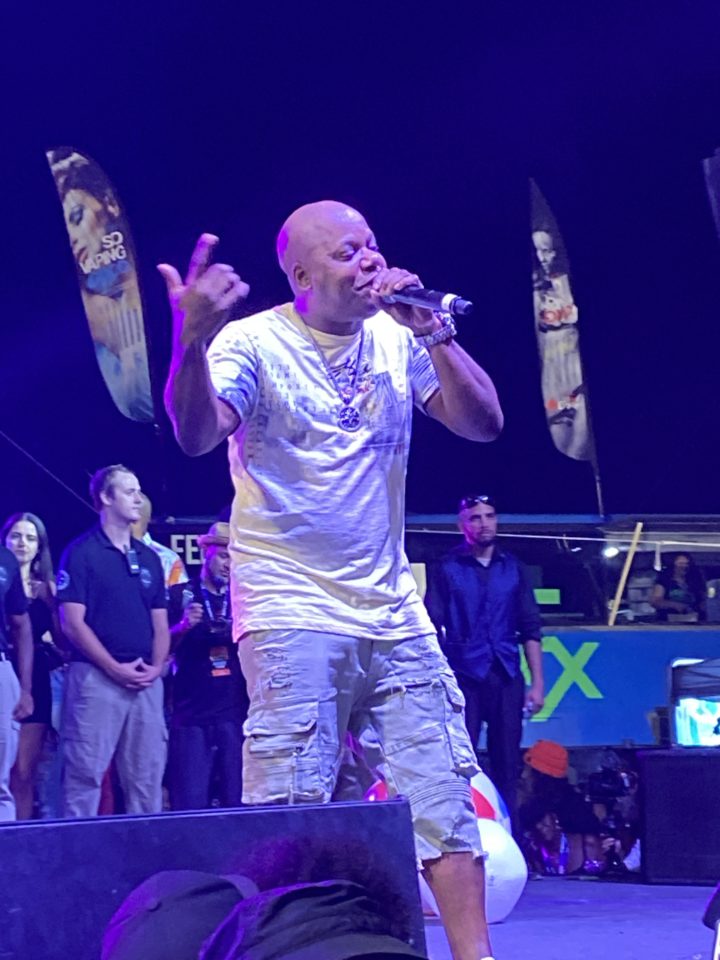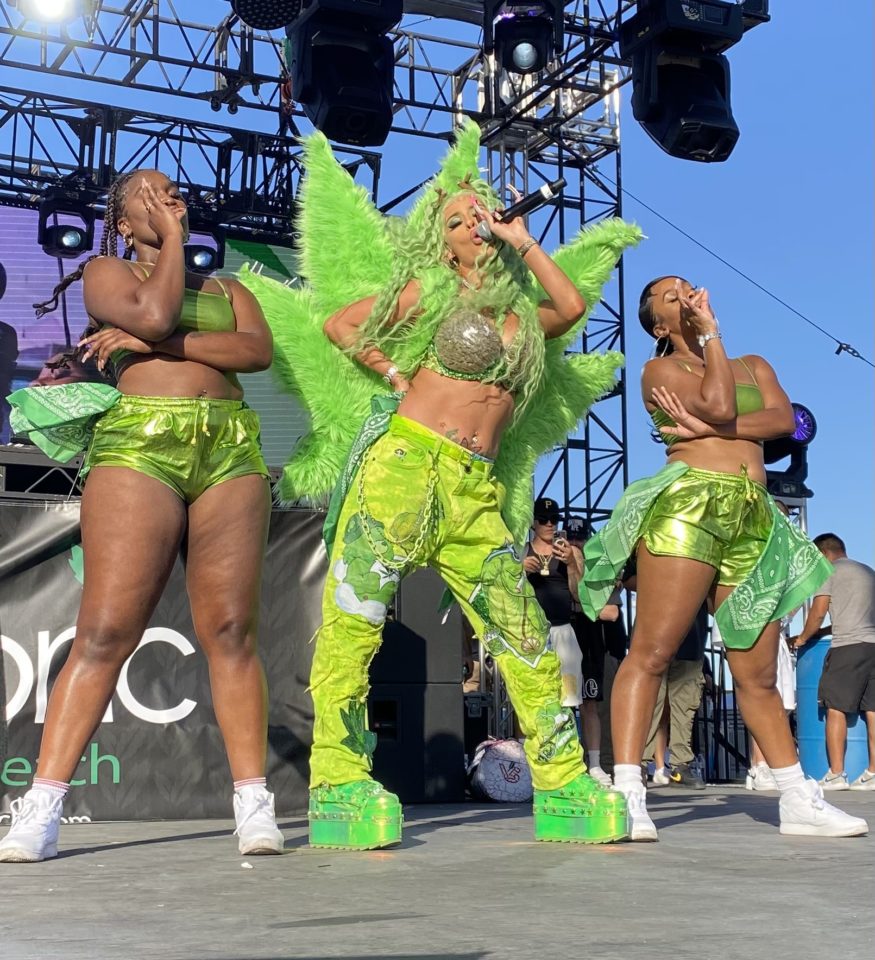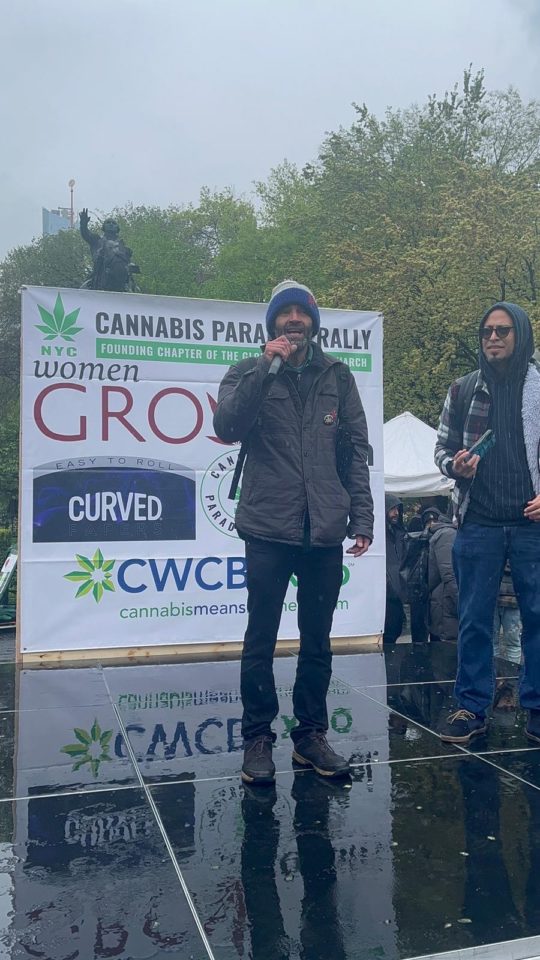Brian Simpson had a unique journey to the stage: He was a foster child and served in the Marine Corps. Over ten years ago, he attended a comedy show in San Diego that was so bad it convinced him to give it a go.
Now, the host of the podcast BS with Brian Simpson is delivering tightly structured, hilarious sets on his Short Wide Neck Tour. He finds fresh angles in the familiar. Recently, Simpson told us about how he crafts his material and how to raise the bar for yourself.
This interview has been edited and condensed for clarity.
When did you do your first gig?
I did my first standup comedy in February 2011. It first became an idea for me when all my friends and shit started telling me that I was funny all of a sudden. So I started learning that I could make people laugh when I was complaining about stuff.
How different was your material back in 2011? Or was it pretty similar to now?
I mean the first joke I ever wrote, I still use, but most of it was… It wasn’t garbage, but it was just basic. Everybody starts out with jokes about fucking, and pissing, and shitting, because that’s the most relatable subject. It’s just bodily functions. I think everybody starts out kind of in that vein, or you try to be an edge-lord, and say, “The Holocaust didn’t happen,” or something stupid like that. I was the guy that was doing basic shit.
What were some of the first clubs you performed at?
Well, it was two places, really. One was called the Mad House Comedy Club in San Diego. And this other place was called Queen Bee’s Art and Cultural Center, and they had an open mic there once a week. Those are my two main places where I first started at. I got the most stage time in those places, so that’s where I put most of my time in.
Were they good experiences?
As good as they can be. Yeah. I mean, what experience is all good? I guess that’s what makes you a comedian. I look at any experience and tell you what’s fucked up about it. I’ll be at a wedding, just scowling: “Oh, this is such a waste of money.”
[Laughs] Do you still feel that way?
Yeah. I’m not a big fan of pageantry, or things just for show. They just get under my skin so bad. I don’t want to be in a parade. I don’t want to be at any kind of ceremony if I can help it.
You look very comfortable on a stage in front of a crowd.
Oh, yeah. See, that’s different though. Being in front of a crowd and being in the crowd are two different things. Being in front of the crowd is only scary if you don’t know what you’re doing. But being in a crowd is scary all the time. Anything can go wrong. Maybe that’s not a reasonable fear. It might just be crippling social anxiety.
You have a great 30 minute set in [Netflix’s] The Standups Season 3. How’d you prepare?
I think I might have run the set maybe 20 times. But in truth, it was more than that because at first I was running an hour, and I found out it was 30 minutes. And so, it was just a half hour of that, and deciding what comes in and goes out. All of those little meticulous things, which you don’t really have to do. Some people wing it, but it makes me feel comfortable because it’s absolutely the thing that I’m not lazy about. I’ll do all the little tricks and measuring, and recording, and whiteboard, and all of these things to try to make it better. Oh, and weed.
How does weed help when you’re writing?
Well, what happens is when I’m trying to joke for the first time, I like to be high. I don’t like to be high on stage a lot of times, but when I’m trying a joke for the first time, I like to be high. For some reason it just puts you in that creative headspace. You do that on stage with something with a structure to it, and your mind just goes places. And that’s what you need.
You need the tension of the moment and your mind going places that it doesn’t normally go, bam. Because it’s like once you have an idea, you try to find all the angles. You know what I’m saying? It’s like a video game. Some of those angles are hidden behind the weed key. Some of those, you need the mushroom key to unlock. So when it’s all said and done, I try to do every joke in every mindset, to see what I left on the bone.
Needing “the tension of the moment,” that’s a nice way to describe overthinking or paranoia.
Oh, yeah. You know, that mentality has helped me. Edibles used to knock me on my ass. Or I would get so high and just wish I wasn’t that high. But then knowing that, “Oh, this is just me overthinking being high. I’m okay.” You know what I mean?
Yeah. Usually I also try to say to myself, “Things will be okay.”
Yeah, yeah. Or I listen to music. It gives me something to focus on, other than how high I am. Yeah, it’s the best.
You said you don’t perform much while high, right?
Oh, well I do, but only when I’m doing new stuff. The thing is I don’t mind being high on stage in other circumstances, and I’ve certainly done it. But what I hate is if I show up high and go up on stage, that’s fine, but I won’t get high before I go on stage, because what happens is if it kicks in while you’re on stage, it throws all the energy off. It’s almost like your brain’s clicking into another mode, but that split second between the modes, it’s like a hard reset.
I think you feel it more because when you’re on stage, your adrenaline is pumping so high. Even if you’re chill, your adrenaline is up. And so, I think you just feel that weed hit different, and it just stops everything for just a split second, but the crowd can tell. They’re like, “Something’s up.” This is just me. I don’t know about everybody else. But when the weed hit me on stage, I have a problem. If I’m already high before I go up, that’s perfectly fine.
It’s funny you said how with comedy, it’s the one thing you’re not lazy at, but I find that ironic considering your past in the Marine Corps. I imagine that requires an incredible amount of discipline and hard work.
No.
No?
It’s just like anything else. It requires an incredible amount of discipline and hard work to be good at it, not to be there. It takes a minimum amount of work to be there. It takes a lot of work to excel.
That’s a very good distinction. Did you get a lot of material from your days in the Marines?
No. Well, no, that’s not true. Yeah, I would just say the way I see the world was very shaped by that experience. And so a lot of my observations of… All the things I know about white people, I learned in the military. I didn’t necessarily write that joke back then though. It’s not even really in a military setting. I guess it has to be because I set it up that way.
You mentioned using chalkboards, and just really nailing the structure … When do you know the structure’s just right for a set, like for the The Standups set?
Oh, see, I didn’t nail it though.
Why not?
That’s why I can’t even watch it. I can’t even watch it. No man, well, I left a lot of pet words in there, a lot of ums and uhs and mm-hmm. Would’ve been perfect. There were probably 27 of them. That keeps it from being perfect. I mean, perfectly as I want it.
Do you always feel that way after you perform, thinking about what maybe didn’t work instead of what did work?
It’s torture. Yeah, I think a lot of comics think that way too. It’s not good. I think it makes it difficult to enjoy your victories, because your mind is so used to going there. Even after you triumph, your mind is used to going, “Right. Okay. Well, what was fucked up about it?”
Have you ever walked off stage and thought, “That went as good as it could have gone”? Do you ever feel that way?
Oh, yeah, yeah. I felt that before, that’s rare though. That’s rare. People like to throw around the term “killing” and “destroying” a lot, but that’s so rare. Even the best in the world don’t fucking kill, don’t destroy every set. You know what I mean? It might be more often for them that they kill, but it’s still, it’s not even more than half. Most comics, we do really, really, really well, but that’s not killing. Killing is everybody’s dead. They done. They laugh so much, they finish.
I know it can be hard to pinpoint, but was there a moment where you thought, this is my voice and this is my style on stage?
I mean, there was a point, but I don’t remember exactly what that moment was. But I remember several times just being like, “Oh man, I leveled up. I leveled up. I just did something I wasn’t capable of doing before.” And see, and that’s the other thing. Killing changes with… Because when you start and you go from no laughs to some chuckles, that feels like killing.
So it’s like the funnier you get, the higher you raise the bar for what’s killing. So that’s why it might feel like you killed, but you didn’t kill. You don’t know that until you go watch somebody actually kill, and you go, “Oh, okay.” Does that ever happen to you? You see a comic that’s so much better than you, that you’re just like, “Oh wow. I thought I was killing it. I got to go back and write.” You know?
Oh, yeah. I’ll think, maybe I’m doing fine, but then I’ll read something fantastic and feel down, like, “Ah, I’m not doing as well as I thought I was.”
No, but you need that. It’s necessary. I mean, that’s why everyone moves here to L.A. or to New York. Once you’re the big dog wherever you at, you need to get the fuck out of there. I’m saying every second you waste around in rooms where you’re the best comic, you’re wasting your time. You need to be around people that make you sharp. And with people every night [that] make you go, “Holy shit. I need to rewrite some shit.” You want that every day, to see somebody that’s better than you.
So, when do you know you’re leveling up exactly? Is it just based on the laughs?
I guess there’s no way to quantify getting better at comedy, but people close to you can tell. “Oh man, you’re better now.” And when you get that … you tell your jokes differently. I mean most of the time it means you’re telling them better, but I’m sure if I listen to that same exact joke with the same exact wording from five years ago, it’ll sound different.
The post Comedian Brian Simpson Doesn’t Want To Kill It appeared first on High Times.
source
https://hightimes.com/culture/comedian-brian-simpson-doesnt-want-to-kill-it/?utm_source=rss&utm_medium=rss&utm_campaign=comedian-brian-simpson-doesnt-want-to-kill-it



